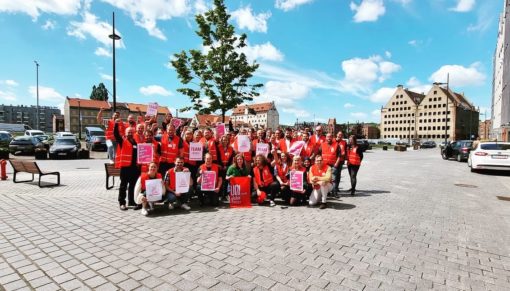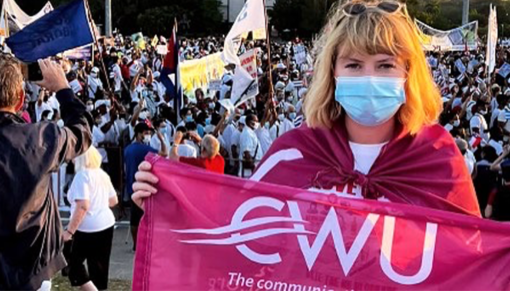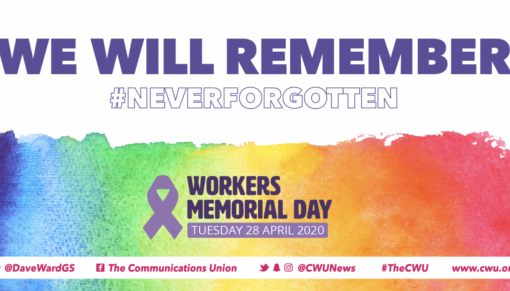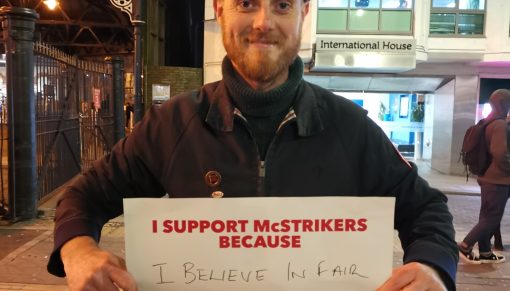Shock survey results validate CWUYouth homelessness campaign
October 15 2015At last Saturday’s annual Youth Conference, the question of housing and homelessness was once again very high on the agenda.
The conference endorsed motions to take forward the union’s now well- established campaign with partners Crisis (the homeless homelessness charity specialising in single people –http://www.crisis.org.uk/) and Young Labour (www.younglabour.org.uk/youthhomelessness). Indeed, it was great to have young Labour’s vice chair Bex Bailey (@bexbailey6) as a guest speaker and the indirect into active group exercise she ran at the conference generated a lot of good ideas.
 But the conference coincided with the deadline for submissions to the Parliamentary Select Committee that is investigating the private rented sector. This is the leading type of accommodation lived in by young CWU members (43%), followed by owner occupiers (35%) and those living with parents (20%).
But the conference coincided with the deadline for submissions to the Parliamentary Select Committee that is investigating the private rented sector. This is the leading type of accommodation lived in by young CWU members (43%), followed by owner occupiers (35%) and those living with parents (20%).
The results of a survey of our young members found that it was expensive, with nearly 40% having to spend more than 40% of their take-home pay on rent (and a similar figure when it comes to mortgage payments too).
 There is a high incidence of sharp practice by landlords, especially over handling complaints and raising rents, but a low awareness of where to get advice and help. This clearly shows that there is a need for further campaigning on this issue.
There is a high incidence of sharp practice by landlords, especially over handling complaints and raising rents, but a low awareness of where to get advice and help. This clearly shows that there is a need for further campaigning on this issue.
The full results of the surveyand a copy of our submission can be found via the links below.
But I think the plight of our members is better summarised by local work that has been done by former NEC member and now community activist Nick Nichols. He interviewed young members to assist us with our research. None of our members want to be identified by name so we have anonymised his report. Nevertheless, it makes quite shocking reading.
Nick writes:
“For a majority of local young postal workers, benefits only seem to become an issue when they take holidays or are off sick for some time. The reason is that the great majority seem to be employed on 20 hour contracts even though they work a 40 hour week. For example, one individual was off work with a broken arm for several weeks, and found himself in debt very quickly. There are others however that will be directly affected with the new single bedroom housing benefit requirement in that if they are housed in a two bedroom flat they lose their housing benefit. For example, one individual who at present receives albeit a small housing benefit, has been advised that he will not only lose that small sum, but will be required to pay an extra £14 per week rent from this coming April.
I have no real figures to quote how many will be affected by cuts in their tax credits given individuals seem generally unhappy to discuss this. It may be that at present they are unaware as to how it will actually affect them.
I have had the opportunity to speak to a senior officer in a local Housing Association and am advised they are expecting a real increase in homeless young people over the coming months, and increasing problems faced by young people in receipt of housing benefit.
One young woman I spoke to who was prepared to discuss her situation lives with her partner and small son aged 2 years 6 months. Her partner is an apprentice cook, paid £3.50 an hour for a 30 hour week on the basis that he is an apprentice. She herself only works part time simply because if she worked full time, they would lose all their benefits and be financially worse off. Given her situation, like so many other young people in the town, they have little option to do otherwise.
 Also in Townsville there is a hostel for young people who have faced real difficulties in their personal lives. All are on benefit, and have no other option than to remain as such especially given that Townsville is designated a deprived area and work in generally low paid and part-time.
Also in Townsville there is a hostel for young people who have faced real difficulties in their personal lives. All are on benefit, and have no other option than to remain as such especially given that Townsville is designated a deprived area and work in generally low paid and part-time.
Whilst others see Townsville as a thriving town this is simply due to the increasing demographic change in the town that has seen an influx of new, mainly wealthy retired residents from the South East of England. For the local young people mentioned, the reality is that if they took a job, they would not be able to afford the hostel flat they now live in, and they would certainly not be able to afford a local flat given local rent levels. Of course the other problem is that there is a dearth of one bedroom flats in and around Townsville.
 There is of course the hidden young homeless that sofa surf’ around the town. I have asked for details from both individuals concerned and the manager of the hostel, but again they have been reluctant to make what they see as an official comment and sadly I feel that such is the position across much of the region.
There is of course the hidden young homeless that sofa surf’ around the town. I have asked for details from both individuals concerned and the manager of the hostel, but again they have been reluctant to make what they see as an official comment and sadly I feel that such is the position across much of the region.
I would add that food banks’ are now very much on the increase and those using it would in the main seem to be young single parents.
Again I apologise I could not convince any individual to be interviewed. I did of course give an undertaking that any information would be in the strictest confidence, but my assurances were to no avail. In all respects I am sure that the information I have gleaned is mirrored across the country, but hope it is of some use to you.”
It is no surprise that leading health policy research group Kings Fund also this week publish their research to show the £600 million annual cost to the NHS of poor housing (www.kingsfund.org.uk/time-to-think-differently/trends/broader-determinants-health/housing-conditions-and-home-ownership). The determined drive, thanks partly to the CWUYouth campaign, to restore the historic link between good housing and good social health is welcome.
But we need to continue to keep housing and homelessness on our agenda and to raise it up the agenda. The debates at Youth Conference and the survey results show it is an issue that is of central importance to our young members.



























































